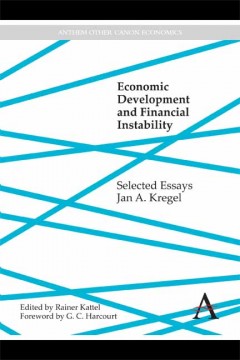Economic Development and Financial Instability
Selected Essays
By Jan A. Kregel
Edited by Rainer Kattel
Foreword by G. C. Harcourt
Other Formats Available:
E-Book- About This Book
- Reviews
- Author Information
- Series
- Table of Contents
- Links
- Podcasts
About This Book
Jan A. Kregel is considered to be “the best all-round general economist alive” (G. C. Harcourt). This is the first collection of his essays dealing with a wide range of topics reflecting the incredible depth and breadth of Kregel’s work. These essays focus on the role of finance in development and growth. Kregel has expanded Minsky’s original postulate that in capitalist economies stability engenders instability in international economy, and this volume collect’s Kregel’s key works devoted to financial instability, its causes and effects. The volume also contains Kregel’s most recent discussions of the Great Recession beginning in 2008.
Reviews
Author Information
Jan A. Kregel is a senior scholar at the Levy Economics Institute of Bard College, director of its Monetary Policy and Financial Structure program, and Professor of Development Finance at Tallinn University of Technology, Estonia.
Series
Anthem Other Canon Economics
Table of Contents
Foreword by G. C. Harcourt; Publication History; I. Theoretical Discussions; 1. Financial Markets and Economic Development: Myths and Institutional Reality; 2. External Financing for Development and International Financial Instability; 3. Capital Flows: Globalization of Production and Financing Development; 4. Some Risks and Implications of Financial Globalization for National Policy Autonomy; 5. Two Views on the Obstacles to Development; 6. Can We Create a Stable International Financial Environment that Ensures Net Resource Transfers to Developing Countries?; 7. Natural Instability of Financial Markets; 8. Trying to Serve Two Masters: The Dilemma of Financial Regulation; II. Finance for Development; 9. East Asia Is Not Mexico: The Difference Between Balance of Payments Crises and Debt Deflations; 10. “Yes ‘IT’ Happened Again”: The Minsky Crisis in Asia; 11. Financial Liberalization and Domestic Policy Space: Theory and Practice with Reference to Latin America; 12. Derivatives and Global Capital Flows: Applications to Asia; 13. Was There an Alternative to Brazilian Crisis?; 14. An Alternative View of the Argentine Crisis: Structural Flaws in Structural Adjustment Policy; 15. The Discrete Charm of the Washington Consensus; III. The Crisis in the US and the EU; 16. Alternative Economic Analyses of German Monetary and Economic Unification: Monetarist and Post Keynesian; 17. Currency Stabilisation through Full Employment: Can EMU Combine Price Stability with Employment and Income Growth?; 18. Minsky’s “Cushions of Safety,” Systemic Risk and the Crisis, in the Subprime Mortgage Market; 19. Why Don’t the Bailouts Work? Design of a New Financial System versus a Return to Normalcy; 20. Is This the Minsky Moment for Reform of Financial Regulation?; 21. Debtors’ Crisis or Creditors’ Crisis? Who Pays for the European Sovereign and Subprime Mortgage Losses?; 22. Six Lessons from the Euro Crisis; 23. Minsky and the Narrow Banking Proposal: No Solution for Financial Reform; Index
Links
Stay Updated
Information
Latest Tweets



